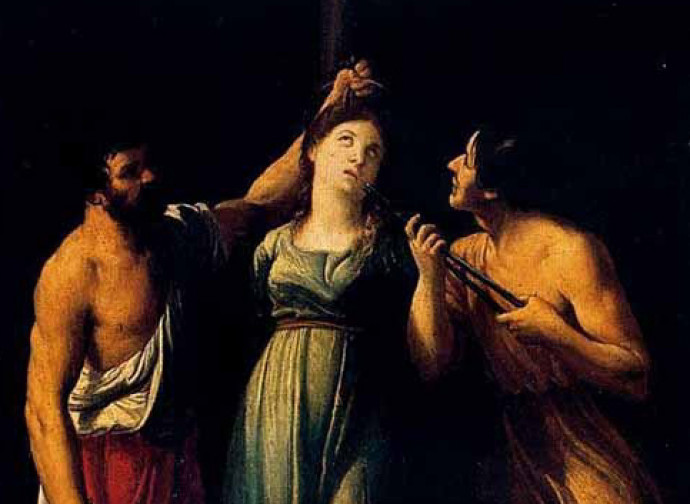Saint Apollonia
The Ecclesiastical History by Eusebius of Caesarea (265-340) reports the contents of a letter from Saint Dionysius of Alexandria (190-265) to Bishop Fabius of Antioch, where the martyrdom of Saint Apollonia is described as a consequence of the preaching of a fortune-teller who had incited the pagan crowds of Alexandria to persecute Christians.

The Ecclesiastical History by Eusebius of Caesarea (265-340) reports the contents of a letter from Saint Dionysius of Alexandria (190-265) to Bishop Fabius of Antioch, where the martyrdom of Saint Apollonia is described as a consequence of the preaching of a fortune-teller who had incited the pagan crowds of Alexandria to persecute Christians. This, according to the same letter, occurred before the persecutions ordered by the Emperor Decius (249-251): "The persecutions with us did not commence with the imperial edict, but preceded it by a whole year".
The letter continues with the story of the tortures inflicted on an old man named Metras and a woman called Quinta, both of them eventually stoned to death, and describes numerous other acts of violence perpetrated by the pagans: "with one impulse they all rushed upon the houses of the God-fearing, and whatever pious persons any of them knew individually as neighbours, after these they hurried and bore them with them, and robbed and plundered them, setting aside the more valuable portions of their property for themselves".
In this scenario is set the martyrdom of Apollonia, described by Dionysius as an elderly "virgin of admirable qualities". The Saint, who had grown in the Christian faith since childhood, doing her best to assist other Christians, was captured, and her persecutors "knocked out all her teeth by hitting her jaws". Then they lit a stake and "threatened to burn her alive unless she would repeat along with them their expressions of impiety", which consisted in denying Christ. Faced with that alternative and preferring death to apostasy, Apollonia herself, without waiting to be pushed, jumped into the flames: an act of contempt for sin, and a final appeal to her torturers that they might be warned and convert.
The French abbot Prosper Guéranger (1805-1875), proclaimed Servant of God in 2005, thus wrote on the martyrdom of the Saint: "What ardour you had, o Apollonia! The flame of the stake, far from frightening you, attracts you, and you run there as to a place of delights. In the face of sin, death is sweet to you and you do not wait for the barbarous hand of men to throw you into it. Such courage confuses our weakness; although the brazier that you preferred to apostasy, and that in a few moments was to give you birth to endless happiness, is nothing compared to the eternal fire that the sinner faces at all times [...]. This is why the worldly are scandalised by the saints, finding them exaggerated, impulsive, fanatic, because the saints see further away than them. […] Pray for sinners, open their eyes to the dangers that threaten them; let us fear God, so that we can avoid His justice and actually begin to love him".
Patron of: dentists; also invoked by people who suffer from dental problems
